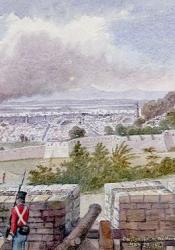The Opium Wars
Opium Wars
1-1839-1842-Britain vs China
2-1856-1860-Britain and France vs China
Britain went to war with China twice in the Victorian Era. These wars are called the Opium wars because opium was at the heart of both conflicts. Beginning in the 1700s, Britain imported many Chinese products, including silk, porcelain, and tea. The problem, from the British point of view, was that the Chinese didn’t seem to want anything the British had to offer (including cotton) and demanded silver for their products. This did not make the East India Trading Company—the major player in British trade at the time—very happy. Someone, somewhere, came up with the idea to grow opium and sell it to the Chinese. “…by the 1820s, the balance of trade was reversed in Britain’s favour, and it was the Chinese who now had to pay with silver” (Hayes).
The Chinese didn’t like this at all. They “…recognized that opium was becoming a serious social problem and, in the year 1800, it banned both the production and the importation of opium. In 1813, it went a step further by outlawing the smoking of opium and imposing a punishment of beating offenders 100 times.” Unfortunately, it wasn’t enough and by 1838, 40,000 opium chests were being smuggled into China each year. China had enough and stopped foreign trade. In response to the stoppage of trade and because of an attitude that “…that China was out of touch with “civilized” nations,” Britain fought back and in 1839 the first Opium War began. In the end, Britain won both wars and forced China to open their doors to trade and forced the legalization of opium use.
There are two reasons I find these wars interesting. The first is that in all the books we read this semester, silk is associated with the upper-class. That means that the obsession/expectation that the landed gentry and aristocracy had in wearing these fabrics contributed to the Opium Wars.
The second fascinating thing about the Opium Wars is that China ceded Hong Kong to Britain in the Treaty of Nanjing. This is the beginning of the political/social problem we see in the news today as Hong Kong reverts to China. The ramifications of these wars, that ended over 160 years ago, are continuing today.
https://asiapacificcurriculum.ca/learning-module/opium-wars-china

